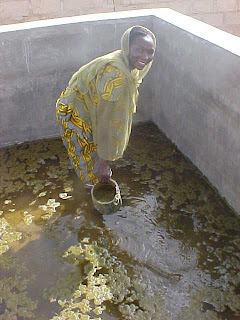
It's not an impressive sight. When one drives (or most walk), up to the fellowship center of the believers in Damaturu, Yobe State, one wonders what is located here: an abandoned building, a room for animals, someone's uncompleted home. However, when one walks in to sit down, everything changes. Followers are meeting here and they sing with passion. The prayers of the disciples are inspiring as they are uttered in such austere conditions.
The thought first occurred to me to begin encouraging the believers in Damaturu in the fall of 2005 after our family moved to Maiduguri. Dr. Uche Eni, a servant among the Maiduguri followers, performed a week of surgery every month in the far northwestern Yobe State city of Nguru. Dr. Eni would always leave on the first day of the week and had to miss fellowship because of the distant journey from Maiduguri to Nguru. One day I proposed to Dr. Eni that I drive him to Damaturu (closer to Nguru) so that we could break bread with the disciples there. From then on, Dr. Eni and I developed a monthly routine when we would leave Maiduguri by 7:30AM on the week's first day, stop in Damaturu to rendevous our brothers & sisters, then I would drop him at the motor park to finish the final leg of his journey to Nguru.
It has been during these 2 1/2 years of visits to the fellowship in Damaturu that I first met Ebenezer Udofia. Ebenezer was the "Executive Agricultural Administrator" at RNT Farms in Damaturu covering 1.5 miles by 1.5 miles. As Dave Goolsby from Healing Hands International visited Maiduguri, I invited Ebenezer for some discussions. Dave was immediately sold on Ebenezer's credentials and encouraged me to request his services at the INTERCEP farm in Maiduguri. Graciously, Ebenezer recently covenanted to come on board our work with INTERCEP in Maiduguri by developing some livestock additions for our drip irrigation farm: poultry (broilers & layers), rabbits, & rams.

The most impressive site when one enters Damaturu is the new huge mosque just commissioned by the state governor in May of 2007. It is apparently the largest mosque in West Africa and the 2nd largest in Africa only to the Friday mosque of Cairo, Egypt. Damaturu is a state capitol that was commissioned when Yobe State was carved out of Borno in 1996. This immediately put Damaturu on the map and brought it out of obscurity to a commercial center. However, the overriding sense that one is overwhelmed with when one drives through Yobe State is desert poverty.
As INTERCEP has located a branch office in the northeastern Nigerian hub of Maiduguri, one must pass through Damaturu. There has been a fellowship there for a number of years but it has failed to mature due to a long line of proclaimers without the tenacity to endure the harsh conditions of this desert city. Now that Ebenezer is coming to serve with INTERCEP in Maiduguri, we will not forget our kindred spirits in Damaturu. We dare to dream that the Almighty has big plans to bless the brothers & sisters at Damaturu through agriculture, health care, skill acquisition, education, and in-depth discipleship. Won't you dare to dream with us at Arewa Aid to demonstrate compassion to these desert disciples?




















